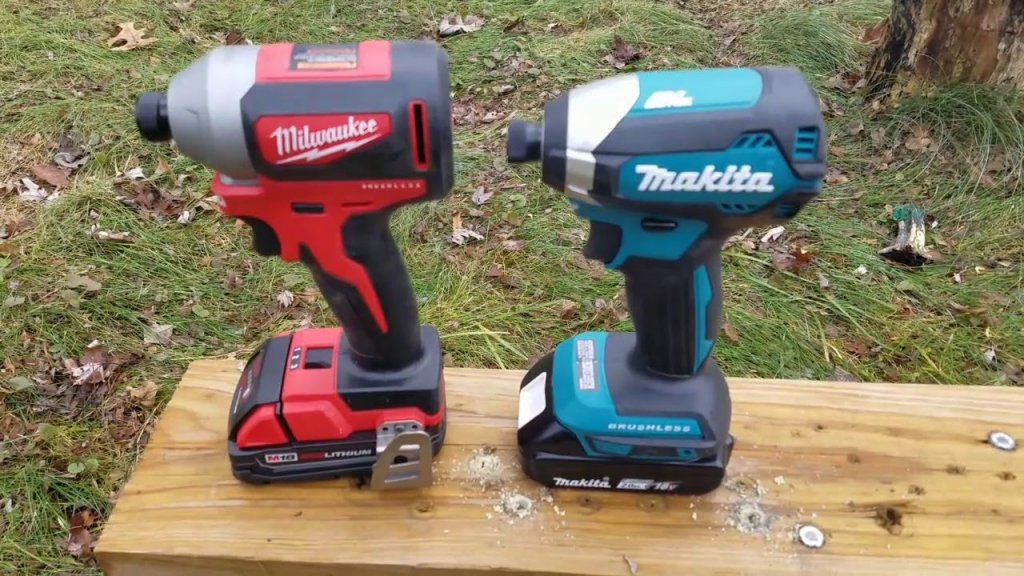Choosing the right power tools is a crucial decision for both DIY enthusiasts and professionals. In the sea of brands, the ‘Makita vs Milwaukee’ choice often emerges as a common dilemma, reflecting the prominence and quality of these two industry leaders.
Understanding the nuances of Makita and Milwaukee’s offerings goes beyond mere brand loyalty; it’s about finding tools that align with your specific needs and projects.
In this comprehensive comparison, we will delve into the detailed specifications, user experiences, and practical applications that set Makita and Milwaukee apart.
Let’s start by exploring the rich histories and product innovations that have defined these brands in the power tool industry.
Makita
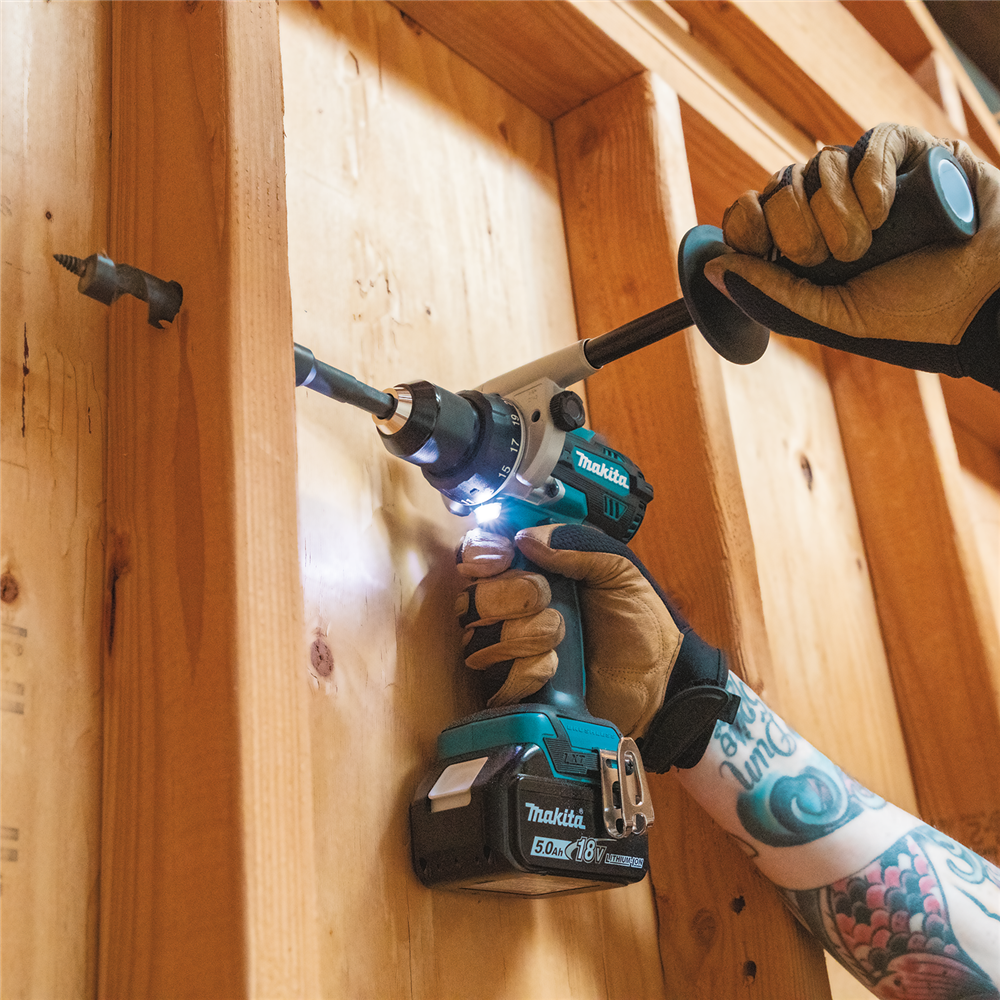
Established as a Japanese manufacturer, Makita has been at the forefront of power tool innovation since 1915. Initially focused on repairing lighting equipment, motors, and transformers, Makita transitioned to power tool manufacturing in 1958.
This move marked the beginning of its journey to become a household name in the power tool sector.
Makita’s global presence is impressive, with directly operated business bases in over 50 countries and a sales network spanning approximately 170 countries.
This expansive reach underscores their commitment to quality and innovation. Notably, Makita is renowned for its high-quality motors, which are crafted using premium raw materials.
The brand’s dedication to excellence extends to the use of superior steel in shafts and gears, coupled with rigorous quality testing, setting a high standard in the ‘Makita vs Milwaukee’ debate.
Milwaukee

Milwaukee’s roots trace back to the same era as Makita, originally named A. H. Peterson. A significant turning point for Milwaukee was its collaboration with Ford Motor Company, developing a lightweight and portable power drill for Henry Ford.
This project catalyzed Milwaukee’s pivot to power tool manufacturing.
Initially, the Milwaukee Electric Tool Corporation primarily served the North American market, gaining widespread recognition in the United States after being acquired by Atlas Copco. Now, under the ownership of the Hong-Kong based Techtronic, Milwaukee has cemented its status as a major player in the power tool industry.
As we explore the ‘Makita vs Milwaukee’ comparison, it’s evident that both brands have achieved global acclaim with manufacturing units across the world. Their similar trajectories set the stage for a nuanced comparison of their unique offerings.
Makita vs Milwaukee: Distinguishing Key Features
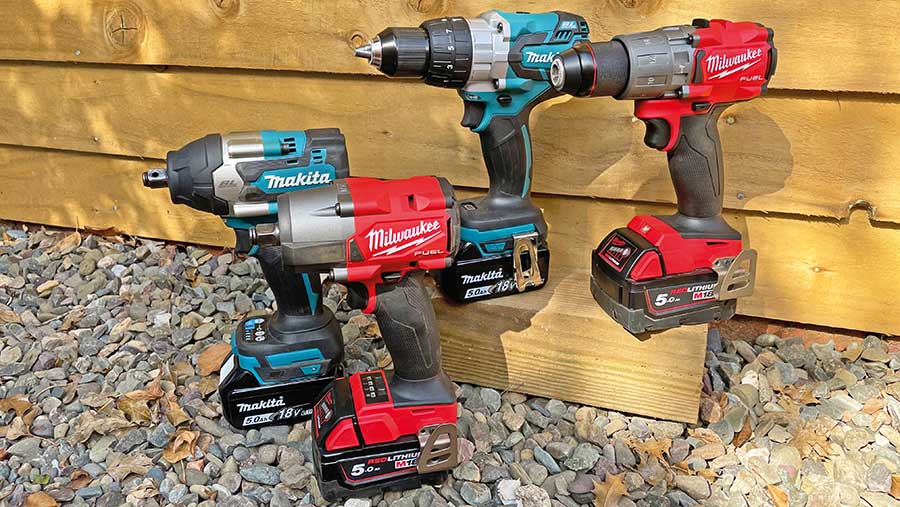
When evaluating ‘Makita vs Milwaukee’, understanding the distinct features each brand offers is crucial. Here’s how these two power tool giants stand apart in terms of their innovative features.
Makita: Combining Affordability with Advanced Technology
- Affordable Yet High-Quality: Makita is recognized for offering competitively priced products without compromising on quality. This affordability, paired with robust performance, makes Makita a preferred choice for many.
- Star Protection Technology: Modern Makita tools are equipped with a sophisticated communication system. This technology is pivotal in preventing overheating, overloading, and over-discharging, ensuring durability and safety during use. The real-time data communication enhances user experience and tool maintenance.
- LXT Lithium-Ion Battery Technology: The efficiency of Makita’s lithium-ion batteries stands out, particularly with their cross-compatibility across different tools. Their prolonged runtime – up to 50% longer – is a testament to their technological prowess.
- LXT Brushless Motors: Makita’s use of brushless motors is notable for their efficiency and longevity. Available in various sizes, these motors cater to a wide range of tools, from compact drills to powerful saws.
Milwaukee: Engineered for Professional Grade Performance
- Four-Mode Drive Control: Milwaukee’s recent innovation in drive control enhances user control over their tools, offering tailored speed and power output for diverse applications.
- Professional Grade Construction: Milwaukee’s commitment to professional-grade tools is evident. Their power tools are designed to withstand heavy-duty applications, echoing the quality of premium professional equipment.
- POWERSTATE Brushless Motors: The efficiency of Milwaukee’s POWERSTATE motors is a key feature, minimizing overheating and ensuring a constant power supply, which is crucial for demanding tasks.
- REDLINK Plus Intelligence: This system in Milwaukee tools optimizes performance while offering protection. The intelligent communication between the tool, battery, and charger sets a high standard in tool efficiency and safety.
- REDLITHIUM Battery Technology: Milwaukee’s REDLITHIUM battery technology is noteworthy for its extended runtime and overall longevity, a crucial aspect for professionals relying on uninterrupted tool performance.”
Makita vs Milwaukee: A Quality Comparison
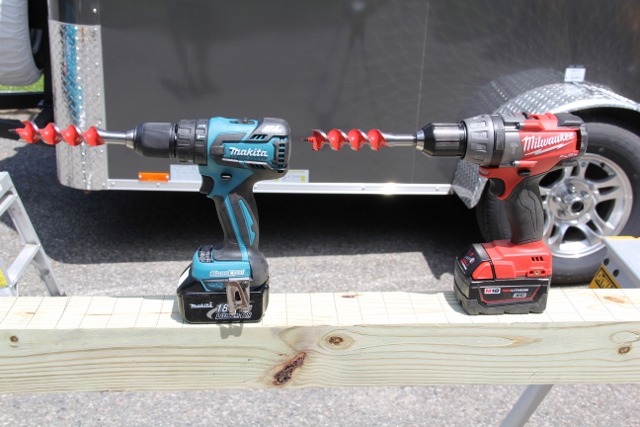
In the ‘Makita vs Milwaukee’ debate, assessing the quality of their offerings reveals significant differences and unique strengths of each brand, crucial for informed decision-making.
Makita: Versatility Meets Affordability
- Diverse Product Range: Makita distinguishes itself with a broad range of tools, including petrol-powered options. This versatility makes Makita appealing to a wide array of users, from casual DIYers to professionals.
- Budget-Friendly Solutions: Consistently, Makita strikes a balance between affordability and quality. Their tools are known for offering reliable performance without a hefty price tag, making them accessible to a larger audience.
- Corded Tool Options: Makita’s strong portfolio in corded tools is a nod to their legacy as an electric motor manufacturer. They offer a diverse range of corded tools, catering to those who prefer the reliability of direct power supply.
Milwaukee: Emphasizing Durability and Advanced Features
- Focus on Cordless Technology: Milwaukee sets itself apart by primarily offering cordless tools. This focus reflects their commitment to innovation and catering to the evolving needs of professionals who require mobility and flexibility in their tools.
- Durability and High-End Features: Milwaukee’s products are often celebrated for their durability and advanced features. They are designed to endure demanding environments, making them a preferred choice for heavy-duty applications.
- Price Reflects Quality: While Milwaukee tools tend to be on the higher end of the price spectrum, this is indicative of their investment in quality and advanced features. For professionals seeking tools that can withstand rigorous use, Milwaukee often justifies its price with superior performance and longevity.
In summary, while Makita offers versatile and affordable tools suitable for a wide range of applications, Milwaukee excels in providing durable, feature-packed tools designed for demanding professional use.
This distinction in quality and focus areas forms a core part of the ‘Makita vs Milwaukee’ comparison.
Makita vs Milwaukee: Warranty Coverage Comparison

Warranty policies are a significant aspect in the ‘Makita vs Milwaukee’ discussion, influencing customer confidence and satisfaction. Both brands offer warranties, but their approaches differ notably.
Makita: Consistent Three-Year Warranty
- Uniform Coverage: Makita simplifies its warranty approach by offering a three-year warranty across all its products. This uniform coverage reflects Makita’s confidence in their product quality and commitment to customer satisfaction.
- Exclusions to Note: It’s important to highlight that Makita does not extend this warranty to cover manufacturing defects, which is a consideration for buyers.
Milwaukee: Variable but Extensive Warranty Options
- Flexible Warranty Terms: Unlike Makita, Milwaukee adopts a more varied approach to warranties. Depending on the tool, Milwaukee’s warranty can range from several months to a lifetime. This flexibility allows them to tailor the warranty to the specific tool and its anticipated use.
- Lifetime Coverage for Manufacturing Defects: Notably, Milwaukee offers a lifetime warranty on manufacturing defects for many of its tools, demonstrating their commitment to long-term tool performance and customer assurance.
Understanding the Fine Print
For both Makita and Milwaukee, it’s essential for customers to understand the specific terms and conditions of the warranties offered. Checking the respective websites for detailed information and any limitations or requirements is recommended for an informed purchase decision.
In conclusion, while Makita offers a straightforward three-year warranty on its products, Milwaukee provides variable warranty terms, including lifetime coverage for manufacturing defects, offering an edge in the warranty aspect of the ‘Makita vs Milwaukee’ comparison.
Makita vs Milwaukee: Analyzing the Price Point
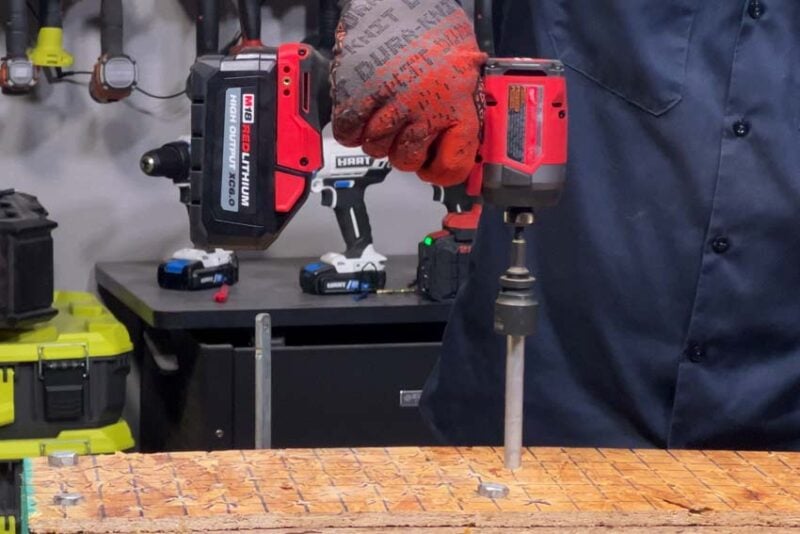
In the ‘Makita vs Milwaukee’ comparison, understanding the pricing structure of each brand is essential, as it often influences the final purchasing decision.
Makita: Affordability with Competitive Quality
- Moderate Pricing: Makita typically positions its products in a more moderate price range. This affordability, combined with their commitment to quality, makes Makita an attractive option for both hobbyists and professionals who are budget-conscious.
- Close Quality Match: In recent years, Makita has intensified its efforts to elevate the quality of its tools, bringing them closer to the high-end standards of Milwaukee, yet maintaining more accessible pricing.
Milwaukee: High-End Quality at a Premium
- Premium Pricing for Advanced Features: Milwaukee’s products are generally priced higher, reflecting their focus on high-end quality and advanced features. This premium is often justified by the durability, efficiency, and innovative technology integrated into their tools.
- Price Difference Perspective: While the price difference between Makita and Milwaukee can range from 10-20%, with Makita usually being the more budget-friendly option, this gap is relatively modest given the quality and features offered by both brands.
Price as a Factor in Decision Making
It’s important to consider that while price is a significant factor, it should be weighed alongside other elements like tool quality, specific features, and warranty coverage.
The choice between Makita and Milwaukee should not solely hinge on price but on which brand aligns better with your specific needs and preferences.
Ultimately, Makita offers a more budget-friendly choice without compromising much on quality, whereas Milwaukee caters to those seeking premium, feature-rich tools, justifying their higher price point in the ‘Makita vs Milwaukee’ debate.
Makita vs Milwaukee: Outdoor Power Tools
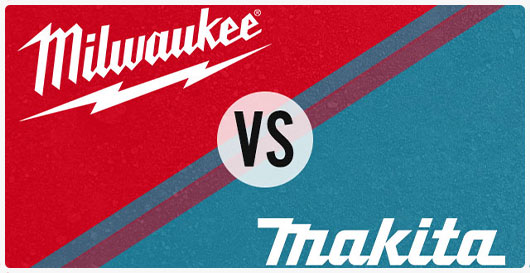
In the ongoing ‘Makita vs Milwaukee’ comparison, exploring each brand’s expertise in outdoor power tools reveals distinct approaches and strengths.
Milwaukee: Embracing Modern Battery-Powered Solutions
- Recent Foray into Battery-Powered Outdoor Tools: Milwaukee has expanded its portfolio with the MX FUEL series, marking its entry into the battery-powered outdoor tool segment. This move signifies Milwaukee’s adaptability and commitment to evolving technology in power tools.
- Early Stages in Outdoor Equipment: Prior to MX FUEL, Milwaukee had limited presence in the outdoor petrol-driven tool sector. Their recent venture, however, demonstrates a growing interest and potential in this field.
Makita: Established Legacy in Outdoor Equipment
- Decades of Outdoor Tool Innovation: Makita’s involvement in outdoor power tools dates back to the 1990s, following the acquisition of Dolmar, a reputable name in petrol-powered equipment. This acquisition not only expanded Makita’s range but also enhanced their expertise in outdoor tools.
- Innovative Four-Stroke Engine Technology: A notable achievement for Makita was the development of a new, more efficient four-stroke engine. This technology significantly improved power output by 30% while reducing emissions by 90%, a testament to Makita’s dedication to both performance and environmental sustainability.
Comparative Advantage in Outdoor Tools
Makita’s long-standing experience and innovation in outdoor power tools give it an edge in this category. While Milwaukee is making strides with its MX FUEL series, Makita’s depth of experience and technological advancements in this arena are noteworthy.
For users prioritizing outdoor tool performance and environmental consciousness, Makita holds a distinct advantage in the ‘Makita vs Milwaukee’ debate.
Makita vs Milwaukee: Corded Tools

In the ‘Makita vs Milwaukee’ comparison, the corded tools segment presents a distinct contrast between the two brands, reflecting their historical origins and current market focus.
Makita: A Rich Legacy in Corded Tools
- Rooted in Electric Motor Manufacturing: Makita’s origins as an electric motor manufacturer have profoundly influenced its corded tool lineup. This background ensures a robust range of high-quality corded tools, known for their reliability and performance.
- Commitment to Quality and Testing: Makita emphasizes quality in its corded tools, utilizing premium-grade materials. Each tool undergoes approximately 19 extensive tests, ensuring top-notch performance and durability before reaching the customer.
Milwaukee: Selective Focus on Corded Tools
- A Strategic Shift to Battery Power: Milwaukee’s range of corded tools, though limited, reflects their strategic shift towards battery-powered tools. This focus has led to a reduced but specialized selection of corded tools.
- High-Quality Offerings in Key Areas: While their range is narrower, Milwaukee’s corded tools, including large hammers, saws, grinders, and breakers, are engineered with the brand’s signature quality and are highly regarded in the industry.
Comparative Perspective in Corded Tool Options
Makita’s extensive variety in corded tools gives it an edge for users who value a wide selection and the reliability of a direct power supply.
On the other hand, Milwaukee’s focused approach caters to those who prefer specialized, high-quality corded tools for specific tasks.
Thus, in the ‘Makita vs Milwaukee’ debate, Makita leads in the diversity of corded tools, while Milwaukee shines through its specialized, quality offerings.
Makita vs Milwaukee: Tool Verdict
Let’s focus on some key power tool categories to provide a final comparative perspective.
18v Cordless Driver
- Makita’s Advancements: Makita’s recent upgrades in this category have significantly elevated the quality of their 18-Volt LXT Lithium-Ion 1/2″ Driver, aligning it closely with Milwaukee’s standards.
- Milwaukee’s Compact Efficiency: The Milwaukee M18 compact drill driver stands out for its lightweight design, weighing just 3.5 lbs, without compromising on power and functionality.
18v Cordless Jigsaw
- Milwaukee’s User-Friendly Design: The M18 FUEL 18-Volt Jigsaw from Milwaukee boasts of a tool-free blade change and an impressive SPM of 3,500, along with a design that enhances user comfort and efficiency.
- Makita’s Comparable Performance: Makita’s 18V LXT Cordless Jigsaw matches Milwaukee in terms of SPM, offering similar performance, but Milwaukee takes a slight lead with additional user-friendly features.
Tool Kits
- Milwaukee’s Premium Kit: The Milwaukee M18 fuel cordless kit, priced higher, justifies its cost with superior performance, battery life, and quick charging capabilities.
- Makita’s Value Proposition: Makita’s XT601 18V LXT Li-Ion Cordless 6-piece Combo kit, while more affordable, provides a commendable balance of performance and value, suitable for a wide range of applications.
Bottom Line
Makita and Milwaukee are the most recommended brands when it comes to power tools. As we have seen, Milwaukee has some excellent and most reliable tools, priced more than Makita. Makita offers a balance between price and quality.
If you are a DIYer, there is no point in spending hundreds of dollars more for a kit. Makita will provide more than enough of what you need.
But if you are a professional looking for heavy-duty equipment, Milwaukee should be your pick especially because they focus on durability.

